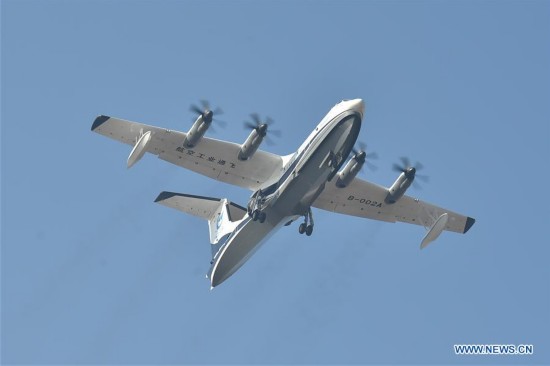


China's first home-grown large amphibious aircraft AG600 takes off at the Jinwan Civil Aviation Airport in Zhuhai, south China's Guangdong Province, Dec. 24, 2017. AG600, code named "Kunlong", completed its maiden flight on Sunday. (Xinhua/Liang Xu)
BEIJING, March 8 (Xinhua) -- Four AG600 large amphibious airplanes will conduct flight tests to facilitate its certification schedule, said its developer the Aviation Industry Corporation of China (AVIC) Friday.
In 2019, AVIC will focus on three major aspects to push forward the AG600 project - the flight test of No.001 aircraft, the aircraft design optimization, and parts fabrication, said AVIC.
The flight test of the No.001 AG600 aircraft will be conducted to test the model's characteristics of stalling, hydrodynamic and flight envelope extension.
Meanwhile, test pilots will also begin training for this new model.
Codenamed "Kunlong," the AG600 is designed to be the world's largest amphibious aircraft. This large-scale special-purpose civil aircraft is developed to assist with fighting forest fires and water rescues.
The AG600 conducted its maiden flight in December 2017 and completed its first water takeoff and landing in October 2018.
It can carry out sea rescue operations under complex meteorological conditions and can withstand two-meter-high waves. It is capable of carrying 50 people during a maritime search and rescue mission. It also provides support for China's marine monitoring and safety patrol.
In the following design optimization of the AG600, the designing team will optimize the structure and systems to tap the potential of the large aircraft platform, according to AVIC.
Meanwhile, they will improve designs of the aircraft's maximum take-off weight, installing pressure cabins, as well as improving the systems of firefighting and emergency rescue.
According to the plan, the parts fabrication of the No. 003 AG600 airplane will start in 2019, said AVIC.
AVIC will facilitate the AG600 project schedule to receive an airworthiness review and obtain the certificate, which are crucial steps for the model to start playing roles in emergency rescue and natural disaster prevention.
 Fire brigade in Shanghai holds group wedding
Fire brigade in Shanghai holds group wedding Tourists enjoy ice sculptures in Datan Town, north China
Tourists enjoy ice sculptures in Datan Town, north China Sunset scenery of Dayan Pagoda in Xi'an
Sunset scenery of Dayan Pagoda in Xi'an Tourists have fun at scenic spot in Nanlong Town, NW China
Tourists have fun at scenic spot in Nanlong Town, NW China Harbin attracts tourists by making best use of ice in winter
Harbin attracts tourists by making best use of ice in winter In pics: FIS Alpine Ski Women's World Cup Slalom
In pics: FIS Alpine Ski Women's World Cup Slalom Black-necked cranes rest at reservoir in Lhunzhub County, Lhasa
Black-necked cranes rest at reservoir in Lhunzhub County, Lhasa China's FAST telescope will be available to foreign scientists in April
China's FAST telescope will be available to foreign scientists in April "She power" plays indispensable role in poverty alleviation
"She power" plays indispensable role in poverty alleviation Top 10 world news events of People's Daily in 2020
Top 10 world news events of People's Daily in 2020 Top 10 China news events of People's Daily in 2020
Top 10 China news events of People's Daily in 2020 Top 10 media buzzwords of 2020
Top 10 media buzzwords of 2020 Year-ender:10 major tourism stories of 2020
Year-ender:10 major tourism stories of 2020 No interference in Venezuelan issues
No interference in Venezuelan issues
 Biz prepares for trade spat
Biz prepares for trade spat
 Broadcasting Continent
Broadcasting Continent Australia wins Chinese CEOs as US loses
Australia wins Chinese CEOs as US loses